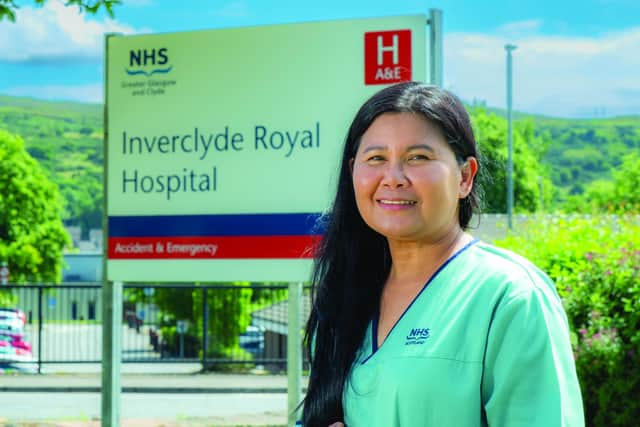Education and Careers: keep your options open
Sharon McIntyre, head of Career Information, Advice and Guidance at Skills Development Scotland (SDS), the national skills agency, explains how its My World of Work service can assist. She says that life developments can spur people on to make a change.
“We had a really interesting discussion with a gentleman that had been in engineering for a long time and a personal bereavement made him rethink his career. Then there are some people who retire early, such as from the fire service or police, and are looking for new opportunities,” explains McIntyre.
Advertisement
Hide AdAdvertisement
Hide Ad“But there can also be a worrying side to this with people facing redundancy. We work with the Scottish Government in the Partnership Action for Continuing Employment (PACE) initiative for dealing with redundancy situations to offer advice and guidance.”


She adds that My World of Work helps people focus on the positives. “I like to think we are the absolute key service to build confidence. We take a strength-based outlook. It’s about growing people’s skills, rather than re-training them.
“You will always have skills that are transferable. We recently worked with someone who had a career as a plumber and went into health and social care.”
McIntyre is seeing more career fluidity than ever before, partly because of skills shortages, as well as the speed of change as a result of new technologies including artificial intelligence (AI).
“We’re finding that people are willing to take more of a chance and look for what else is out there. My World of Work is a great stimulus for that,” she says.


Her advice is that people should never think it is too early or too late for a change: “You should think about your career on an ongoing basis and consider if you are getting what you need out of what you’re doing.Don’t wait until there’s a crisis point or life shock.”
A route that is becoming more popular, and not just for school leavers, is to undertake an apprenticeship.
Scott Killen, employer liaison and recruitment manager for Graduate Apprenticeships at Edinburgh Napier University, says: “Approximately half of our Graduate Apprenticeship starts are existing staff who are looking to upskill or retrain through their current employer.
Advertisement
Hide AdAdvertisement
Hide Ad“The courses can help them attain an honours degree without having to make financial sacrifices – and because Graduate Apprenticeships offer work-integrated learning, participants can undertake the course and balance their time without the need to reduce working hours.”
Killen adds that Graduate Apprenticeships have the significant additional benefit of being fully-funded, meaning that participants graduate with a debt-free honours degree. For those who are unable to commit to a full-time degree, there are also a number of funded, flexible short courses available through Edinburgh Napier, many of which are online.
He says: “We have formed successful working partnerships with a multitude of employers in Scotland, ranging from micro-SMEs to multinational organisations. Partner industries include technology, construction, financial services, public sector, hospitality and telecoms.
“Our Graduate Apprenticeships have grown rapidly and have already made a positive impact on Scotland’s labour market.”
The Open University offers a plethora of distance-learning options, including degrees, short courses and skills-based training. And anyone with an income of less than £25,000, domiciled in Scotland, can get access to free education.
It can also help employers tackle skills shortages. This year’s Business Barometer report, published in June by the Open University and the British Chambers of Commerce, found that 71 per cent of Scottish organisations are experiencing skills shortages. Despite this ongoing issue, almost 40 per cent of Scottish organisations don’t have any specific initiatives, skills programmes or workplace adjustments in place for specific talent pools, including underrepresented groups such as people with disabilities.
The report suggests that employers are missing out on a hidden talent pool and an opportunity to grow their own talent base.
David Allen, acting depute director for external engagement and partnerships at The Open Universityin Scotland, says: “The majority ofour students are studying on apart-time basis. That gives a number of benefits. Firstly – and this is a big thing, particularly during the cost-of-living crisis – it allows people to earn and learn at the same time.
Advertisement
Hide AdAdvertisement
Hide Ad“As a university, we have a strong ethos on widening participation and access. We say there is pretty much always a route if someone wants to study with us. That could be using our open learning platform, which is free and gives an introductory flavour. You’ve got thousands of courses there, covering everything from how to write a CV to understanding the planets in the solar system.”
Within the online learning environment of the Open University, students still have access to staff tutors and can get support on a one-to-one basis and in group forums online.
Allen reports that many of its students have been unemployed for a long time, had addiction issues and/or previous convictions, and live in areas of high deprivation.
He adds: “About 25 per cent of our learners have a registered disability. We work closely with disability charities to support them into employment.”
Scotland’s colleges are another option. Edinburgh College vice principal Jon Buglass says: “We have a wide range of options to support people across the nation to upskill, retrain and start a new career.
“We work closely with industry partners and local and national government to ensure that the courses and training on offer equip our students and professionals with the skills they need to have a successful career.”
For people looking to experience something completely new, another route is Raleigh International, which runs environment and community projects.
Lucy Constable Fernandez, its managing director, says: “We see our volunteer managers come to Raleigh International from a whole range of places. Many look to join a Raleigh Expedition to momentarily step away from their career and do something more fulfilling, while others wish to embark on international volunteering to expand their skillset and redirect their careers to one that aligns more strongly with their passions.
Advertisement
Hide AdAdvertisement
Hide Ad“A well thought-out volunteer experience can lead to personal and professional growth that will serve you well in your career and future life – but you need to ensure it is right for you.”
Case study: Mela Lynch
Mela Lynch had been working for Amazon for almost 15 years when she was unfortunately made redundant in March this year.
The 52-year-old, originally from the Philippines and now living in Inverkip on the West Coast, recalls: “I was shocked when I heard that we were being made redundant. I’d heard lots of rumours about redundancies at Amazon, but then I received a phone call telling me that the site in Gourock was closing, and then the site manager confirmed it to us all the following day.
She says, with her husband, that she searched online for help and found redundancy support available from Skills Development Scotland (SDS) as part of the Partnership Action for Continuing Employment (PACE), the Scottish Government’s initiative for dealing with redundancy situations.
SDS leads on the delivery of PACE support with partners including the Department for Work and Pensions, Citizens Advice and Scottish local authorities.
Mela received support from PACE advisor Stephanie Stinson. Mela explains: “I met with Stephanie, who gave me lots of advice, including updating my CV and coaching me through next steps, such as searching and applying for jobs, and doing mock interviews.
“She really helped to build my confidence and kept encouraging me throughout the whole process.”
The PACE team went into the Amazon site in Gourock to speak to all employees affected by the online reatiler’s redundancy programme, giving the workers advice on the next positive steps they could take.
Advertisement
Hide AdAdvertisement
Hide AdMela says that because she has had experience of working in a care home, Stephanie suggested looking to the care sector. Mela now has a job as a domestic worker with the NHS and Inverclyde Hospital in Greenock.